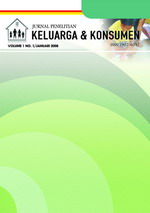PENGARUH TIPE PENGASUHAN, LINGKUNGAN SEKOLAH, DAN PERAN TEMAN SEBAYA TERHADAP KECERDASAN EMOSIONAL REMAJA
Abstract
Emotional intelligent as one aspect of human resources is very important to achieve successful living of individual and society. It is a learned behavior that transferred to individual from social environment from early childhood to old ages through socialization within family and out side the family. Facts show that in Indonesia especially in urban area many adolescent high school boys and girls have limited emotional intelligent. The objective of the study is to analyze the effect of parenting, school environment, and role of peer group to adolescent emotional intelligent. The study was carried out in Bogor Municipality. Two hundred samples consisted of 100 students enrolled in senior high school and their parents, especially mother, respectively were drawn using stratified random sampling method with school performance quality as stratification criteria. Data were collected through interviews and self reporting. Descriptive statistics and multiple regressions were used to analyze the data. Results showed that father education attainment and age of mother affect emotional parenting type. Emotional parenting type, school discipline, emotional learning offered in school curriculum, and role of peer group as social comparison learning affect adolescent emotional intelligent significantly
Copyright (c) 2017 Jurnal Ilmu Keluarga dan Konsumen

This work is licensed under a Creative Commons Attribution-ShareAlike 4.0 International License.
Authors submitting manuscripts should understand and agree that copyright of manuscripts published are held Jurnal Ilmu Keluarga dan Konsumen. The statement to release the copyright to Jurnal Ilmu Keluarga dan Konsumen is stated in Copyright Release Form. Copyright encompass exclusive rights to reproduce, to distribute, and to sell any part of the journal articles in all form and media. The reproduction of any part of this journal is allowed with a written permission from Jurnal Ilmu Keluarga dan Konsumen.










